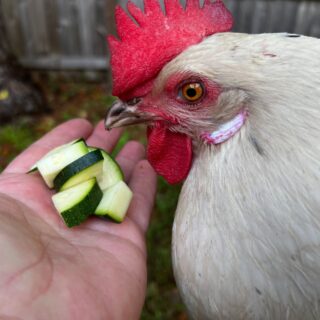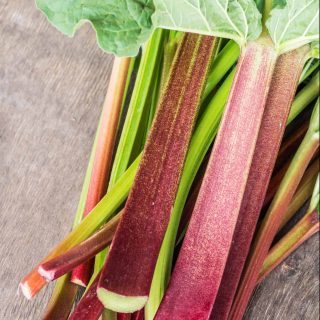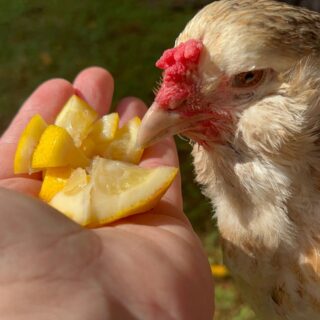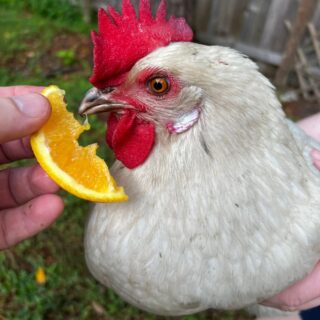Cantaloupe is a staple at most backyard BBQ's during the summer. Inevitably, some is going to end up on the ground. While you try to stop your toddler from putting it in their mouth (c'mon, you know this is true) one of your feathered friends gets to it and runs. So, can chickens eat cantaloupe or is that hen on a midnight train to deadsville?
Keep reading and we'll find out the fate of our flock!
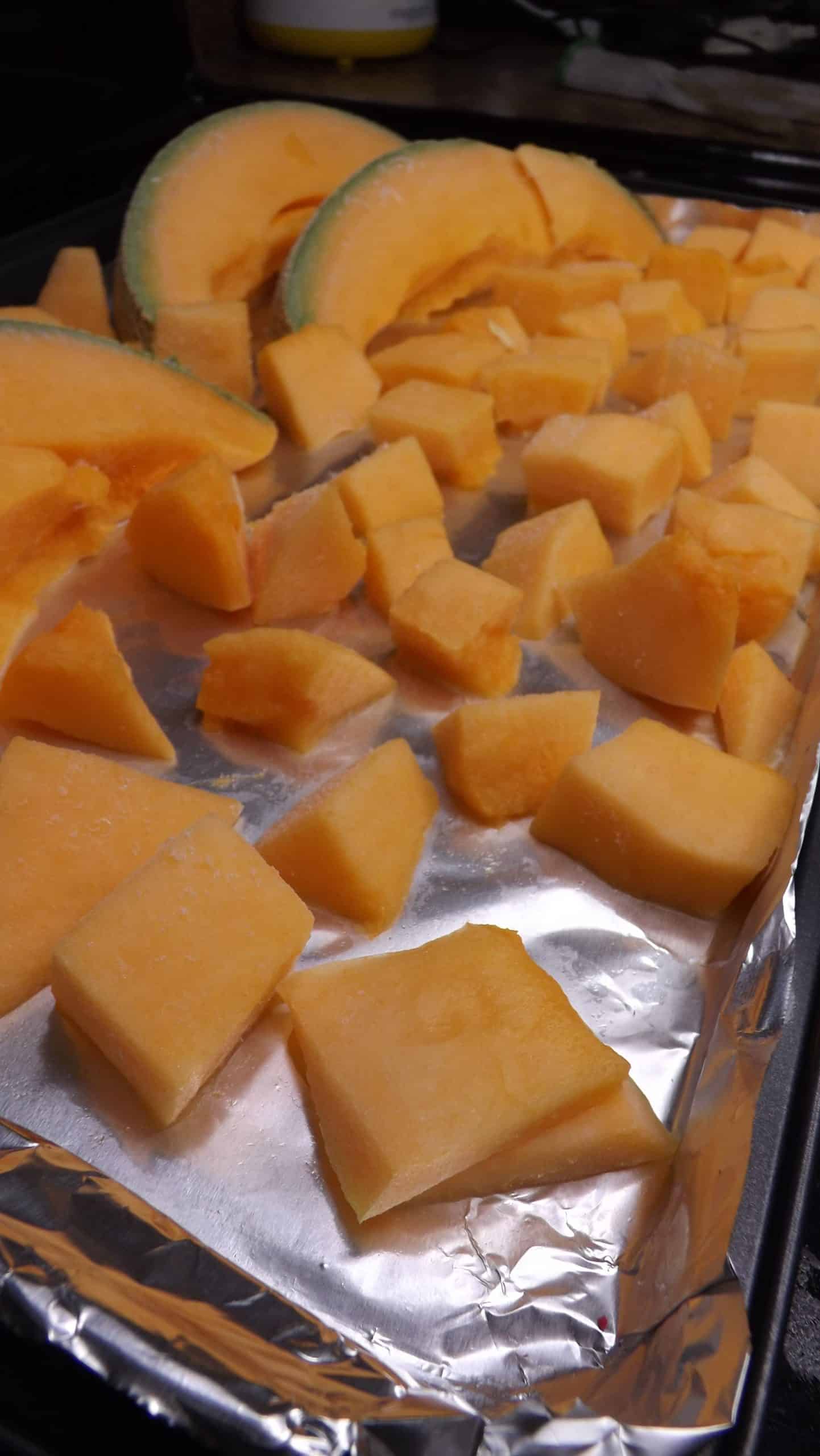
Can Chickens Eat Cantaloupe?
Yes, chickens can eat cantaloupe! Chickens can eat the entire thing, rind, flesh, seeds. And cantaloupe are chock full of healthy vitamins, minerals and antioxidants. Just don't overfeed them because the sugar content can cause blood sugar issues.
Chickens can eat watermelon and all kinds of other melons. They especially love melons as a nice cool down snack in the summer; so try freezing cantaloupe or freezing watermelon and give them something to pack at all day long.
Is cantaloup healthy for chickens?
Cantaloupe can be very healthy when fed in moderation. One of the problems with feeding chickens strawberries, feeding chickens bananas, feeding chickens cherries or any other kind of fruit in excess is that they typically have a high level of sucrose that can lead to hypoglycemia.
Chickens and hypoglycemia
When chickens eat something with sucrose, or sugar, it metabolizes and converts into glucose. Glucose is what the body uses for energy. When the chicken has too much sugar in it's diet they end up with excess glucose in their blood stream which burns very quickly, thus causing a drop in their overall blood sugar balance.
Need some help keeping your chickens health and care taken care of? Check out the Organized Chicken Keeper for an easy to follow system.
What are the nutritional benefits of cantaloupe for chickens?
Cantaloupe is chock full of an assortment of vitamins and nutrients. It can help from everything from vision health, to shiny feathers, to their digestive tract, and even the quality of their egg shells.
According to the USDA's FoodData Center, a single large wedge of cantaloupe has 34.7 calories, or kcal. Additionally, cantaloupe is a terrific source of water and hydration and has no cholesterol or fatty acids.
The table below has a breakdown of the nutritional analysis based on a serving size of 1 large wedge of cantaloupe:
| Name | Amount |
|---|---|
| Water | 92 g |
| Energy | 34.7 kcal |
| Protein | 0.86 g |
| Carbohydrates | 8.32 g |
| Fiber | 0.92 g |
| Fat | 0.2 g |
| Sugars | 8.02 g |
| Calcium | 9.18 mg |
| Potassium | 184 mg |
| Folate | 14.5 µg |
| Vitamin C | 25 mg |
| Vitamin A | 117 µg |
Your chickens will also benefit from the antioxidants present in cantaloupe.
What do these nutrients do?
Antioxidants work to repair damage from free radicals and fight off or prevent future damage. They also protect against oxidative damage which can lead to accelerated issues related to aging. Additionally, antioxidants are known to work as anti-inflammatories, to lower blood pressure, improve heart health in high enough doses, and assist in the development and health of tissue, skin, and feathers.
- Vitamin A: eye, skin, respiratory, and digestive health
- Carotene, Beta (Beta Carotene): egg, feathers, skin, beak, and comb color; converts to Vitamin A
- Vitamin C: joint, cellular, and immune health; collagen synthesis
- Calcium: bones and egg shell strength
- Fiber: only small amounts or they can become constipated, get a blockage, etc; enery, growth, and digestive health
- Folate (B Vitamin): folate deficiency; helps blood formation; healthy feathers & size
- Potassium: temperature control; hydration & electrolyte regulation, metabolism; heart health/heart disease preventative
How do you feed chickens cantaloupe?
You can give your chickens a whole cantaloupe but they will probably peck at it with little to no success and eventually get bored and leave. So, whole may not be a great idea but, fortunately, there are many other ways to feed cantaloupe to your chickens.
Some popular methods are:
- chop it in half and let them peck at it like a bowl
- cut it into quarters or even eighths
- scoop out the seeds and give them to your flock, as well
- bonus points if you dehydrate or roast (maybe skip the salt though) them first and mix it in with your chicken feed
- give them the rind for something to peck at for fun with the ocassional bit of fruit as a reward
How to prepare it
Start the same way you would if you were making it for yourself.
- Wash it
- scrub the outside well to remove any dirt, junk, and pesticide residue
- Cut it
- cut it in half, into wedges, cubes, or rindless slices
- Serve it
- take it out to your chickens
"What Can Chickens Not Eat?" List
we are often asked variations of the same questions like, "What can chickens not eat?", "What fruit is bad for chickens?" or "What is poisonous to chickens?". The truth is, chickens are pretty hardy little creatures and can eat a huge variety of things.
While there are certainly more things that can be harmful, here are some of the most commonly available things that can make your chicken sick or even kill them.
- Acorns: Tanic acid is a huge no-no for chickens. It can cause vomiting, diarhea, dehydration, and, in some cases, be fatal
- Alcohol: as funny as seeing a drunk chicken may be, this is a huge no
- Apple seeds: an apple seed here and there is not likely to be harmful but if they are regularly consuming them, the cyanide in apple seeds can be harmful and deadly
- Candy: The sugar in candy has the same effect as fruit sugar but multiplied. Candy can be very dangerous for chickens.
- Dry beans: contain the toxic compound phytohaemagglutinin. It only takes a handful of beans to poison a human that will probably recover. Your chicken will not likely be as lucky. So cook, not just soak, your beans completely.
- jam, jelly, or preserves: again, with the sugar
- pesticides: is this a real question even?
- raw/green potato peels or skins: solanin is a toxin found in green potato skins. All you need to do is peel any potato before you give it to your chickens
- tea bags: many teas contain tannins which, like acorns, can be toxic
Frequently Asked Questions
Q1. What are the dangers of cantaloupe for chickens?
The most obvious danger of feeding cantaloup to your chickens is the choking hazard. If they get a piece that is too big, they can easily choke. However, unless it's a piece of the hard rind, cantaloup is soft enough that they will likely just peck out small enough chunks that are safe to eat.
If the cantaloup came from a non-organic or pesticide free source, it may have some residue on the rind. That should, in theory, be resolved when you wash it, but it doesn't hurt to be extra careful and either only buy pesticide free or just throw the rind out and only give them the flesh and seeds.
Other dangers can come from leaving the cantaloup out and not cleaning up properly. Cantaloup is best given as a monitored treat so you can dispose of everything that wasn't eaten. Leftover and rotting fruit can attract bugs and rodents, as well as, become a breeding ground for bacteria, including harmful varieties.
Q2. Can I overfeed?
You should not overfeed cantaloup to your chickens. Any type of chicken treat should be kept to around 10% or less of their daily diet.
Q4. What fruits and vegetables are safe for chickens?
Most fruits are safe for chickens to eat. The only caveat is that they are eaten in moderation. Stick to the 90%/10% rule we mentioned earlier and your chickens will be happy and healthy eating any of these fruits and veggies.11
Fruits
Vegetables & Gourdes
Berries
- Blackberries
- Blueberries
- Mountain Ash Berries
- Mulberries
- Raspberries
- Rowan Berries
Berries chickens should NOT eat
Both elderberries and gooseberries can be deadly if your chickens eat them.
If you need more help with taking care of your chickens, check out The Organized Chicken Keeper for a complete system for managing their health through keeping their supplies stocked and coop clean.

